By Lewis West · Friday, March 13, 2015 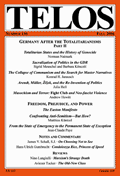 Catastrophic history does not free society: it allows the individual no exit from an endless spiral of destruction. Such destruction promises liberation for some, but it only tilts the world closer to ever-greater annihilation. To place one’s hope in redemptive violence constitutes a leap into the absurd. It is an act of pure faith. This is how Julia Hell, in her essay “Remnants of Totalitarianism: Hannah Arendt, Heiner Müller, Slavoj Žižek, and the Re-Invention of Politics,” reads the apocalyptic politics of Müller and Žižek. Hell frames her critique with a rigorous practicality: she laments Žižek’s “empty terms,” and likewise she sees the political writings of Giorgio Agamben and Judith Butler as hopelessly vague (103). Yet Hell’s rejection of Müller and Žižek does not reflect an entirely pragmatic method. While Hell insists on the need for a usable, specific politics, her attentive readings of each thinker also point to a vast philosophical disagreement. In the end, the true debate is not over the applications of theory. It is instead over the answer to a single question: what is the relationship of politics to death? Catastrophic history does not free society: it allows the individual no exit from an endless spiral of destruction. Such destruction promises liberation for some, but it only tilts the world closer to ever-greater annihilation. To place one’s hope in redemptive violence constitutes a leap into the absurd. It is an act of pure faith. This is how Julia Hell, in her essay “Remnants of Totalitarianism: Hannah Arendt, Heiner Müller, Slavoj Žižek, and the Re-Invention of Politics,” reads the apocalyptic politics of Müller and Žižek. Hell frames her critique with a rigorous practicality: she laments Žižek’s “empty terms,” and likewise she sees the political writings of Giorgio Agamben and Judith Butler as hopelessly vague (103). Yet Hell’s rejection of Müller and Žižek does not reflect an entirely pragmatic method. While Hell insists on the need for a usable, specific politics, her attentive readings of each thinker also point to a vast philosophical disagreement. In the end, the true debate is not over the applications of theory. It is instead over the answer to a single question: what is the relationship of politics to death?
Continue reading →
By Kenneth Rasmussen · Thursday, March 12, 2015 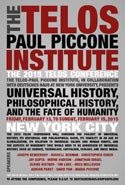 Already in the first third of the 20th century, Karl Jaspers began formulating a philosophy that addressed the collapse of Enlightenment concepts of universal history and offered a perspective that could help us reformulate “universal history” as a viable concept. Jaspers’ work in this area is, I believe, underappreciated, and constitutes a realistic “cosmopolitan vision” that could help us address many of the thorny issues of global cultural conflict and diversity that we face today. Already in the first third of the 20th century, Karl Jaspers began formulating a philosophy that addressed the collapse of Enlightenment concepts of universal history and offered a perspective that could help us reformulate “universal history” as a viable concept. Jaspers’ work in this area is, I believe, underappreciated, and constitutes a realistic “cosmopolitan vision” that could help us address many of the thorny issues of global cultural conflict and diversity that we face today.
Continue reading →
By David Pan · Friday, October 10, 2014 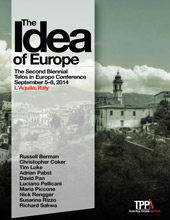 I opened this conference by referring to the medical metaphor within which we have framed the question of democracy in order to point toward two paths for understanding this metaphor and to plead for the practice of both medicine and politics, not as mechanical sciences but as healing arts. In the following paper I would like to provide an example of the kind of artistic practice I have in mind by looking at two case histories of revolutionary movements from below, one success and one failure. What I would like to show in both cases is that the path to success lies in understanding the problem of democracy, first, as a problem of metaphor and thus of representation in the aesthetic sense and, second, as a problem that involves intervention in a developing metaphorical dynamic. I opened this conference by referring to the medical metaphor within which we have framed the question of democracy in order to point toward two paths for understanding this metaphor and to plead for the practice of both medicine and politics, not as mechanical sciences but as healing arts. In the following paper I would like to provide an example of the kind of artistic practice I have in mind by looking at two case histories of revolutionary movements from below, one success and one failure. What I would like to show in both cases is that the path to success lies in understanding the problem of democracy, first, as a problem of metaphor and thus of representation in the aesthetic sense and, second, as a problem that involves intervention in a developing metaphorical dynamic.
Continue reading →
By Charles Kollmer · Monday, July 18, 2011 As an occasional feature on TELOSscope, we highlight a past Telos article whose critical insights continue to illuminate our thinking and challenge our assumptions. Today, Charles Kollmer looks at Kai Evers’s “The Holes of Oblivion: Arendt and Benjamin on Storytelling in the Age of Totalitarian Destruction” from Telos 132 (Fall 2005).
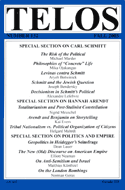 A central concern of critical theory revolves around the difficulty of communicating in the wake of modernity’s crises. Unprecedented trauma and violence obliterate tradition, which historically formed the necessary context for lucid and comprehensible stories. Walter Benjamin famously observed that veterans of World War I returned “not richer but poorer in communicable experience.” In the wake of the war, he notes, the word bekanntlich, or “as everybody well knows,” lost its currency, leaving only Erfahrungsarmut, “the new poverty of experience.” In response to this situation, Benjamin valorized the anti-aesthetic manifest in the works of Karl Kraus and Berthold Brecht, concluding that “all that remains is the discipline of those who destroy.” A similar current of thought underpins many of the philosophical and aesthetic developments in postwar culture, from the Frankfurt School’s critique of Enlightenment empiricism to the Dadaist rejection of canonical artistic authority. A central concern of critical theory revolves around the difficulty of communicating in the wake of modernity’s crises. Unprecedented trauma and violence obliterate tradition, which historically formed the necessary context for lucid and comprehensible stories. Walter Benjamin famously observed that veterans of World War I returned “not richer but poorer in communicable experience.” In the wake of the war, he notes, the word bekanntlich, or “as everybody well knows,” lost its currency, leaving only Erfahrungsarmut, “the new poverty of experience.” In response to this situation, Benjamin valorized the anti-aesthetic manifest in the works of Karl Kraus and Berthold Brecht, concluding that “all that remains is the discipline of those who destroy.” A similar current of thought underpins many of the philosophical and aesthetic developments in postwar culture, from the Frankfurt School’s critique of Enlightenment empiricism to the Dadaist rejection of canonical artistic authority.
Continue reading →
By Dianna Taylor · Thursday, May 5, 2011 Dianna Taylor ‘s “Countering Modernity: Foucault and Arendt on Race and Racism” appears in Telos 154 (Spring 2011). Read the full version at TELOS Online website.
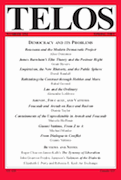 This article explores what the works of Michel Foucault and Hannah Arendt reveal about ways in which harm manifests itself within the context of modern societies, and about how the terrain of modernity might be negotiated such that harm is minimized and the practice of freedom is promoted. Focusing on the specific harm of racism, the article examines how Arendt’s account of the rise and function of Nazism in The Origins of Totalitarianism and Eichmann in Jerusalem reflects a concern with key aspects of the modern form of power that Foucault refers to as biopower. Two important points are derived from this analysis: First, Foucault and Arendt see racism, specifically as reflected in Nazism, as paradigmatic of the destructive potential of modernity. Second, Foucault’s and Arendt’s analyses of Nazi racism as a paradigmatic modern harm reflect a critical “counter-attitude” toward modernity. This counter-attitude provides valuable insight into the workings of and harms produced by modern power and thereby facilitates productive negotiation of the modern landscape. This article explores what the works of Michel Foucault and Hannah Arendt reveal about ways in which harm manifests itself within the context of modern societies, and about how the terrain of modernity might be negotiated such that harm is minimized and the practice of freedom is promoted. Focusing on the specific harm of racism, the article examines how Arendt’s account of the rise and function of Nazism in The Origins of Totalitarianism and Eichmann in Jerusalem reflects a concern with key aspects of the modern form of power that Foucault refers to as biopower. Two important points are derived from this analysis: First, Foucault and Arendt see racism, specifically as reflected in Nazism, as paradigmatic of the destructive potential of modernity. Second, Foucault’s and Arendt’s analyses of Nazi racism as a paradigmatic modern harm reflect a critical “counter-attitude” toward modernity. This counter-attitude provides valuable insight into the workings of and harms produced by modern power and thereby facilitates productive negotiation of the modern landscape.
Continue reading →
By Marcelo Hoffman · Friday, April 22, 2011 Marcelo Hoffman’s “Containments of the Unpredictable in Arendt and Foucault” appears in Telos 154 (Spring 2011). Read the full version at TELOS Online website.
 This article takes as its principal provocation Giorgio Agamben’s claim that Hannah Arendt’s analyses of totalitarianism do not obtain a biopolitical perspective and that, conversely, Michel Foucault’s analyses of biopolitics fall short of adequately addressing totalitarian states, thereby leaving us with mutually compatible absences. I offer an alternative to this dichotomous reading that ultimately develops into a critique of Arendt’s treatment of birth. I suggest that even as Arendt’s analyses of totalitarianism and Foucault’s analyses of biopolitics express diverging arguments about transformations in Western political theory and practice, they nevertheless accentuate the production of predictable states of life. In light of this broad affinity, what stands out is Arendt’s identification of birth as a source of the disruption of predictable states of life whereas Foucault implicitly contests the disruptive potential of birth. This difference matters because it opens up a critical space wherein Arendt appears to fall back on a biological position that she eschews elsewhere and wherein Foucault provides a much-needed remedy to this position. This article takes as its principal provocation Giorgio Agamben’s claim that Hannah Arendt’s analyses of totalitarianism do not obtain a biopolitical perspective and that, conversely, Michel Foucault’s analyses of biopolitics fall short of adequately addressing totalitarian states, thereby leaving us with mutually compatible absences. I offer an alternative to this dichotomous reading that ultimately develops into a critique of Arendt’s treatment of birth. I suggest that even as Arendt’s analyses of totalitarianism and Foucault’s analyses of biopolitics express diverging arguments about transformations in Western political theory and practice, they nevertheless accentuate the production of predictable states of life. In light of this broad affinity, what stands out is Arendt’s identification of birth as a source of the disruption of predictable states of life whereas Foucault implicitly contests the disruptive potential of birth. This difference matters because it opens up a critical space wherein Arendt appears to fall back on a biological position that she eschews elsewhere and wherein Foucault provides a much-needed remedy to this position.
Continue reading →
|
|
 Catastrophic history does not free society: it allows the individual no exit from an endless spiral of destruction. Such destruction promises liberation for some, but it only tilts the world closer to ever-greater annihilation. To place one’s hope in redemptive violence constitutes a leap into the absurd. It is an act of pure faith. This is how Julia Hell, in her essay “Remnants of Totalitarianism: Hannah Arendt, Heiner Müller, Slavoj Žižek, and the Re-Invention of Politics,” reads the apocalyptic politics of Müller and Žižek. Hell frames her critique with a rigorous practicality: she laments Žižek’s “empty terms,” and likewise she sees the political writings of Giorgio Agamben and Judith Butler as hopelessly vague (103). Yet Hell’s rejection of Müller and Žižek does not reflect an entirely pragmatic method. While Hell insists on the need for a usable, specific politics, her attentive readings of each thinker also point to a vast philosophical disagreement. In the end, the true debate is not over the applications of theory. It is instead over the answer to a single question: what is the relationship of politics to death?
Catastrophic history does not free society: it allows the individual no exit from an endless spiral of destruction. Such destruction promises liberation for some, but it only tilts the world closer to ever-greater annihilation. To place one’s hope in redemptive violence constitutes a leap into the absurd. It is an act of pure faith. This is how Julia Hell, in her essay “Remnants of Totalitarianism: Hannah Arendt, Heiner Müller, Slavoj Žižek, and the Re-Invention of Politics,” reads the apocalyptic politics of Müller and Žižek. Hell frames her critique with a rigorous practicality: she laments Žižek’s “empty terms,” and likewise she sees the political writings of Giorgio Agamben and Judith Butler as hopelessly vague (103). Yet Hell’s rejection of Müller and Žižek does not reflect an entirely pragmatic method. While Hell insists on the need for a usable, specific politics, her attentive readings of each thinker also point to a vast philosophical disagreement. In the end, the true debate is not over the applications of theory. It is instead over the answer to a single question: what is the relationship of politics to death?  Already in the first third of the 20th century, Karl Jaspers began formulating a philosophy that addressed the collapse of Enlightenment concepts of universal history and offered a perspective that could help us reformulate “universal history” as a viable concept. Jaspers’ work in this area is, I believe, underappreciated, and constitutes a realistic “cosmopolitan vision” that could help us address many of the thorny issues of global cultural conflict and diversity that we face today.
Already in the first third of the 20th century, Karl Jaspers began formulating a philosophy that addressed the collapse of Enlightenment concepts of universal history and offered a perspective that could help us reformulate “universal history” as a viable concept. Jaspers’ work in this area is, I believe, underappreciated, and constitutes a realistic “cosmopolitan vision” that could help us address many of the thorny issues of global cultural conflict and diversity that we face today.  I opened this conference by referring to the medical metaphor within which we have framed the question of democracy in order to point toward two paths for understanding this metaphor and to plead for the practice of both medicine and politics, not as mechanical sciences but as healing arts. In the following paper I would like to provide an example of the kind of artistic practice I have in mind by looking at two case histories of revolutionary movements from below, one success and one failure. What I would like to show in both cases is that the path to success lies in understanding the problem of democracy, first, as a problem of metaphor and thus of representation in the aesthetic sense and, second, as a problem that involves intervention in a developing metaphorical dynamic.
I opened this conference by referring to the medical metaphor within which we have framed the question of democracy in order to point toward two paths for understanding this metaphor and to plead for the practice of both medicine and politics, not as mechanical sciences but as healing arts. In the following paper I would like to provide an example of the kind of artistic practice I have in mind by looking at two case histories of revolutionary movements from below, one success and one failure. What I would like to show in both cases is that the path to success lies in understanding the problem of democracy, first, as a problem of metaphor and thus of representation in the aesthetic sense and, second, as a problem that involves intervention in a developing metaphorical dynamic.  A central concern of critical theory revolves around the difficulty of communicating in the wake of modernity’s crises. Unprecedented trauma and violence obliterate tradition, which historically formed the necessary context for lucid and comprehensible stories. Walter Benjamin famously observed that veterans of World War I returned “not richer but poorer in communicable experience.” In the wake of the war, he notes, the word bekanntlich, or “as everybody well knows,” lost its currency, leaving only Erfahrungsarmut, “the new poverty of experience.” In response to this situation, Benjamin valorized the anti-aesthetic manifest in the works of Karl Kraus and Berthold Brecht, concluding that “all that remains is the discipline of those who destroy.” A similar current of thought underpins many of the philosophical and aesthetic developments in postwar culture, from the Frankfurt School’s critique of Enlightenment empiricism to the Dadaist rejection of canonical artistic authority.
A central concern of critical theory revolves around the difficulty of communicating in the wake of modernity’s crises. Unprecedented trauma and violence obliterate tradition, which historically formed the necessary context for lucid and comprehensible stories. Walter Benjamin famously observed that veterans of World War I returned “not richer but poorer in communicable experience.” In the wake of the war, he notes, the word bekanntlich, or “as everybody well knows,” lost its currency, leaving only Erfahrungsarmut, “the new poverty of experience.” In response to this situation, Benjamin valorized the anti-aesthetic manifest in the works of Karl Kraus and Berthold Brecht, concluding that “all that remains is the discipline of those who destroy.” A similar current of thought underpins many of the philosophical and aesthetic developments in postwar culture, from the Frankfurt School’s critique of Enlightenment empiricism to the Dadaist rejection of canonical artistic authority.  This article explores what the works of Michel Foucault and Hannah Arendt reveal about ways in which harm manifests itself within the context of modern societies, and about how the terrain of modernity might be negotiated such that harm is minimized and the practice of freedom is promoted. Focusing on the specific harm of racism, the article examines how Arendt’s account of the rise and function of Nazism in The Origins of Totalitarianism and Eichmann in Jerusalem reflects a concern with key aspects of the modern form of power that Foucault refers to as biopower. Two important points are derived from this analysis: First, Foucault and Arendt see racism, specifically as reflected in Nazism, as paradigmatic of the destructive potential of modernity. Second, Foucault’s and Arendt’s analyses of Nazi racism as a paradigmatic modern harm reflect a critical “counter-attitude” toward modernity. This counter-attitude provides valuable insight into the workings of and harms produced by modern power and thereby facilitates productive negotiation of the modern landscape.
This article explores what the works of Michel Foucault and Hannah Arendt reveal about ways in which harm manifests itself within the context of modern societies, and about how the terrain of modernity might be negotiated such that harm is minimized and the practice of freedom is promoted. Focusing on the specific harm of racism, the article examines how Arendt’s account of the rise and function of Nazism in The Origins of Totalitarianism and Eichmann in Jerusalem reflects a concern with key aspects of the modern form of power that Foucault refers to as biopower. Two important points are derived from this analysis: First, Foucault and Arendt see racism, specifically as reflected in Nazism, as paradigmatic of the destructive potential of modernity. Second, Foucault’s and Arendt’s analyses of Nazi racism as a paradigmatic modern harm reflect a critical “counter-attitude” toward modernity. This counter-attitude provides valuable insight into the workings of and harms produced by modern power and thereby facilitates productive negotiation of the modern landscape. 






